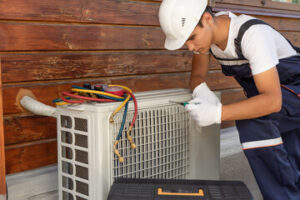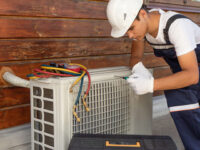Keep Your HVAC System Running Smoothly With Proper Servicing
Typically, the size and age of your HVAC system will affect prices. But, the best way to keep costs down is regular maintenance.
Start by researching potential companies online. Look for reviews and customer ratings on SERP maps, as well as on each company’s website. Also, check to see if they charge for estimates. To find a professional efficiently, click here at https://alltemprefrigerationfl.com/.
 Dirty Filters
Dirty Filters
The air filter is one of those out-of-sight, out-of-mind home maintenance tasks that can cause big problems if not checked and replaced regularly. Filters are an essential part of your HVAC system, helping to keep the air inside your home clean while also preventing dirt and debris from entering components and causing damage.
A dirty filter can lead to several problems, including reduced comfort, higher maintenance costs, and unhealthy air in your home. Dirty filters restrict airflow, requiring the blower to strain harder to move the air and increasing wear and tear on the equipment.
If your filter is very clogged, it may not be able to catch any more particles. This means that those particles will recirculate back through your HVAC system and into your home, which can cause health issues for people with asthma or allergies.
Clogged filters can also increase your energy bills as they restrict airflow. This forces the system to use more energy to operate, which can result in a significant increase in your energy bills.
In some cases, a dirty air filter can cause the system to stop operating altogether as it struggles to push the air through the restricted system. This can cost you thousands of dollars to repair or replace the unit, and it’s often much more expensive than simply repairing or replacing the air filter.
Changing your filters regularly is a simple and inexpensive DIY task that can greatly reduce the stress placed on your system and the overall comfort of your home. It’s an important component of regular maintenance, and it helps to protect your system from unnecessary wear and tear that can lead to expensive repairs or replacements down the line. Contact us today to learn more about our maintenance plans and how they can help protect your home from costly breakdowns. Our experienced technicians can also answer any questions you may have about your air conditioning system or programmable thermostat. We’re happy to help!
Motor Issues
The blower motor is one of the most important components in your HVAC system. It is responsible for sending air throughout your home and adjusting the temperature as needed. It’s important to be able to recognize signs that your blower motor needs servicing or replacement so that you can call in an expert as soon as possible.
Weak airflow from your vents is one of the first indicators that you may need a new motor. The problem could be caused by several things, including an overheated or saturated motor, clogged air ducts, or a defective capacitor. Your professional will perform a thorough inspection to determine the cause and recommend the best solution.
Unusual sounds coming from your vents can also be a sign of a problem with the blower motor. Squealing and screeching noises often indicate a belt or bearing issue, while a banging sound usually means there is a loose or broken component somewhere. Promptly calling in an expert will help prevent these issues from getting worse.
Electric motors are sensitive to contamination and will often seize up, overheat, or stop working if dust or foreign particles get into the inner workings. This is why it is so important to keep them protected from debris by sealing the motor enclosure and keeping it clean.
The start and run capacitors in an AC motor are critical to powering the fan motor when energy is needed. If you hear a humming sound coming from your vents but the AC doesn’t turn on it may be a sign that the start capacitor is failing. A faulty capacitor can cause the unit to short cycle or shut off randomly.
You can check a motor’s windings with a multimeter to see if they are in a good or bad state. To test a motor’s windings, you will need to connect the white wire to each of the other colored wires and then read the results using the ohm meter. A reading of OL (open loop) indicates that the windings are in an open circuit state while an infinite or short circuit reading indicates that the windings are shorted.
Excessive Cycling
Do you notice that your HVAC system turns on and off at erratic intervals? If so, you may be experiencing a problem known as “short cycling.” This problem can cause your system to break down more often, and it puts unnecessary strain on your system’s components. Fortunately, the most common causes of this issue are relatively easy to fix.
A dirty air filter is one of the most common reasons your HVAC system may start short cycling. This is because clogged air filters restrict air flow, which can put unnecessary strain on the system. Make sure you make it a habit to check your air filters regularly and change them as needed.
Ice on the evaporator coil can also trigger short cycles in some systems. This is because the air conditioner’s compressor motor will shut off if it overheats, and this is a safety feature that prevents further damage to your system. If you notice that your evaporator coil is iced over, shut down the system and contact an HVAC professional to have it defrosted.
Electrical issues can also lead to short cycling. A bad control board or thermostat can interfere with the normal cycle of your air conditioner by turning it on and off at the wrong times. Your technician will be able to diagnose and repair these problems, but it may be necessary to replace your thermostat or control board in the long run.
Oversized systems are another common reason for short cycling. This is because an HVAC system that’s too big for your home will work harder to cool it, which can cause the motor and other components to overheat. In this case, replacing your old system with a new, properly sized unit is the best option.
If you have a newer AC that’s experiencing this problem, it could be a sign of refrigerant leaks. This is because many AC units have a low-pressure switch that will turn off the compressor motor if there’s not enough refrigerant in the system. This is a safety feature that can help prevent overheating and damage to the system, so it’s important to have any refrigerant leaks fixed as soon as possible.
Replacement
The longer you wait to replace parts in your HVAC system, the less efficient it will be. Eventually, your home will not be as comfortable and you’ll need to spend more money on heating and cooling. If you’re diligent about maintenance, you’ll get the most out of your equipment and keep it in good working condition.
It’s important to have a licensed contractor perform HVAC replacement, just like with any other type of work in your house. A licensed professional will ensure the job is done correctly, which will prevent any future problems and extend the life of your equipment.
When it comes to replacing a broken part, the price will depend on how the component is damaged and the price of the new one. Some HVAC companies offer a standard maintenance cost guarantee, which covers the labor and parts to repair the unit within a certain period. This is a great way to keep your repair costs down while still getting quality repairs from a trusted technician.
Some parts are expected to be replaced regularly as part of regular maintenance, such as filters or capacitors. Others, such as compressors and contactors, have a lifespan that may be determined by how the system is operated. If you’re concerned about the longevity of your HVAC system, a reliable contractor can help you determine if your system is under warranty.
An HVAC service visit will generally cost between $75 and $200. This includes a visual inspection of the system, making sure all electrical connections are secure and readings are accurate. It will also include a drain cleaning and an air filter check or replacement.
The size of your home and the brand of your HVAC equipment will not affect the service call prices unless you live outside the company’s general service area. In this case, you may be charged an extra travel fee. However, the most significant factor affecting the pricing is if the equipment is still under warranty. Most manufacturers require routine maintenance to be performed, or they will void the warranty.






